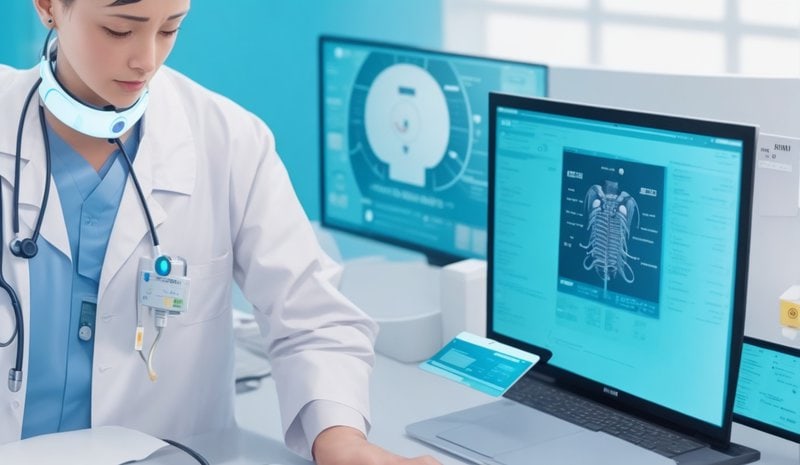Why Ai-Powered Healthcare Diagnostics Are Promising

Are you curious about the promising potential of AI-powered healthcare diagnostics?
Discover the advantages of utilizing AI-powered tools in the detection of diseases, as well as the impact it can have on improving accuracy and speed.
We will also address the challenges that come with integrating AI into healthcare and discuss future prospects. Get ready to delve into this exciting area of medical technology!
Key Takeaways
- AI revolutionizes healthcare diagnostics by analyzing vast amounts of data and detecting patterns.
- AI improves accuracy and efficiency in diagnosing medical conditions, leading to earlier and more accurate diagnoses.
- AI-powered diagnostic tools provide faster and more accurate results, streamlining the diagnostic process and reducing healthcare costs.
- The future prospects of AI in healthcare are promising, with advancements in technology and ethical considerations enhancing patient care.
The Role of AI in Healthcare Diagnostics
You may be wondering, what role does AI play in healthcare diagnostics?
Well, let me tell you, AI, specifically machine learning, has a significant role in revolutionizing healthcare diagnostics. With its ability to analyze vast amounts of data and detect patterns, AI has the potential to improve accuracy and efficiency in diagnosing various medical conditions.
One of the key applications of AI in healthcare diagnostics is in diagnostic imaging. AI algorithms can analyze medical images such as X-rays, CT scans, and MRIs, helping doctors identify abnormalities and potential diseases more accurately and at an early stage. This not only saves time but also enhances patient outcomes by enabling timely intervention.
The role of machine learning in healthcare and the applications of AI in diagnostic imaging have the potential to transform the field of healthcare diagnostics, leading to improved patient care and better health outcomes.
Advantages of AI-Powered Diagnostic Tools
One of the advantages of AI-powered diagnostic tools is that they can provide faster and more accurate results. These tools are designed to analyze vast amounts of data quickly and efficiently, allowing healthcare professionals to make precise diagnoses in a shorter period of time. This not only saves valuable time but also improves patient outcomes by enabling prompt treatment.
Additionally, AI-powered diagnostic tools have the potential to be cost-effective. By streamlining the diagnostic process and reducing the need for expensive tests and procedures, these tools can help lower healthcare costs.
Furthermore, AI can contribute to personalized medicine by tailoring diagnostic algorithms to individual patients, taking into account their unique characteristics and medical history. This individualized approach enhances the accuracy and effectiveness of diagnoses, leading to better treatment plans and improved patient care.
Potential Impact of AI on Disease Detection
The potential impact of AI on disease detection is significant. It can lead to earlier and more accurate diagnoses, improving patient outcomes. AI-powered diagnostic tools have the ability to analyze vast amounts of data quickly and effectively. This allows healthcare professionals to detect diseases at their earliest stages.
This early detection can greatly increase the chances of successful treatment and even prevent the progression of certain diseases. Moreover, AI can help reduce the cost of healthcare. It does so by streamlining the diagnostic process and minimizing unnecessary tests and procedures.
However, the integration of AI in healthcare also raises ethical implications. Ensuring patient privacy and data security is crucial. Additionally, addressing biases in algorithm design is important. These considerations need to be carefully addressed.
Nonetheless, the potential benefits of AI in disease detection make it a promising tool in improving patient care and cost effectiveness.
Improving Accuracy and Speed With AI Diagnostics
Improve accuracy and speed by using AI diagnostics. Harnessing the power of artificial intelligence in healthcare can greatly enhance the efficiency of diagnostics, while also reducing errors. With AI diagnostics, you can expect the following:
- Rapid and precise analysis of medical images, such as X-rays and MRIs, enabling faster diagnoses and treatment planning.
- Identification of patterns and trends in patient data, helping to detect early signs of diseases and provide proactive interventions.
- Real-time monitoring of vital signs and symptoms, allowing for timely interventions and improved patient outcomes.
- Streamlining of administrative tasks, freeing up healthcare professionals to focus more on patient care.
- Enhanced decision support systems, providing clinicians with evidence-based recommendations to optimize treatment plans.
Challenges and Future Prospects of AI in Healthcare
Don’t underestimate the challenges and potential future of AI in healthcare.
As AI continues to make its way into the healthcare industry, there are ethical implications and implementation challenges that need to be considered.
On one hand, AI has the potential to revolutionize healthcare by improving diagnosis accuracy and enabling faster treatment decisions. However, there are concerns regarding patient privacy, bias in algorithms, and the impact on the doctor-patient relationship.
Implementing AI in healthcare also poses challenges such as data integration, technical infrastructure, and regulatory compliance.
Despite these obstacles, the future prospects of AI in healthcare are promising. With advancements in technology and increased awareness of ethical considerations, AI has the potential to greatly enhance patient care, improve outcomes, and revolutionize the healthcare industry as a whole.
Frequently Asked Questions
How Does Ai-Powered Healthcare Diagnostics Impact the Doctor-Patient Relationship?
Ai-powered healthcare diagnostics can improve doctor-patient communication by providing more accurate and timely diagnoses. This can lead to better treatment outcomes and a stronger doctor-patient relationship, as patients feel heard and understood.
Are There Any Ethical Concerns Associated With Using AI in Healthcare Diagnostics?
Ethical implications and legal considerations arise when using AI in healthcare diagnostics. These include concerns about privacy, bias, and patient consent. It’s important to address these issues to ensure responsible and trustworthy AI-powered healthcare diagnostics.
Can Ai-Powered Diagnostic Tools Be Used in All Medical Specialties?
AI-powered diagnostic tools have the potential to be used in many medical specialties, although there may be some limitations. These tools can be customized for specialized applications, improving accuracy and efficiency in healthcare diagnostics.
What Measures Are in Place to Ensure Data Security and Patient Privacy in AI Diagnostics?
To ensure data security and patient privacy in AI diagnostics, measures like encryption, access controls, and anonymization techniques are implemented. These safeguards protect sensitive information and give you peace of mind when using AI-powered healthcare diagnostics.
How Can AI Diagnostics Be Integrated Into Existing Healthcare Systems and Workflows?
To integrate AI diagnostics into existing healthcare systems and workflows, you’ll need to address integration challenges such as data compatibility and system integration. Optimizing workflows can be done by automating routine tasks and streamlining communication between healthcare professionals.






